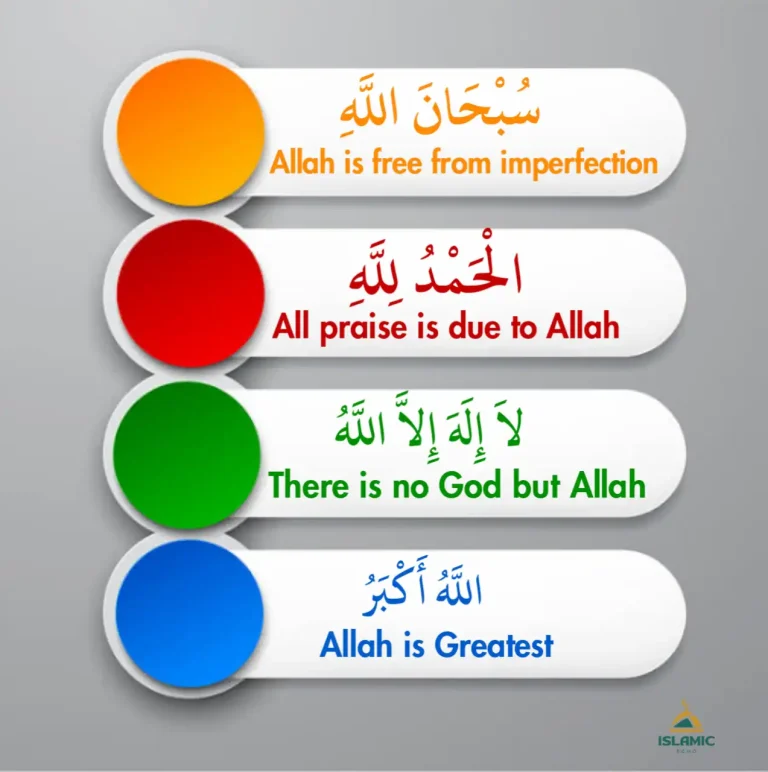Subhanallahi Walhamdulillahi Wala Ilaha Illallah Wallahu Akbar Meaning & Arabic

“The phrases ‘Subhanallahi Walhamdulillahi Wala ilaha illallah Wallahu Akbar’ hold a special place in the Deen of Allah, representing a profound matter and lofty status.
These exquisite forms of zikr (remembrance of Allah) offer immense rewards, elevating one’s rank in the hereafter.
This article aims to enlighten and guide you in understanding the meanings and significance of these three beautiful zikr, enabling you to deepen your connection with Allah and cherish their exceptional value.
Subhanallahi Walhamdulillahi Wala Ilaha Illallah Wallahu Akbar in Arabic Text
These words can be written in Arabic text as:
سُبْحَانَ اللَّهِ وَالْحَمْدُ لِلَّهِ وَلاَ إِلَهَ إِلاَّ اللَّهُ وَاللَّهُ أَكْبَرُ وَلاَ حَوْلَ وَلاَ قُوَّةَ إِلاَّ بِاللَّه
Transliteration: Subhanallah walhamdulillah wala ilaha illallah wallahu akbar wala hawla wala quwwata illa billah.
Subhanallahi Walhamdulillahi Wala Ilaha Illallah Wallahu Akbar Meaning in English
Subhanallahi Walhamdulillah means glory be to Allah, and Praise be to Allah, and There is no God but Allah, and Allah is Great, and There is no Support and No Power except in Allah.
It can also be translated as Far is Allah from imperfection, and all praise be to Allah, and there is none worthy of worship in truth except Allah, and Allah is the Greatest, and There is no Support and No Power except in Allah.
Now let’s look at the deep meanings of these three phrases.
“SubhanAllah” (Tasbih) – Glorifying Allah
“SubhanAllah” means glorifying Allah, acknowledging Him as the Most Perfect, free from defects, and possessing all aspects of perfection. Allah has no partner or rival, and His actions are pure and free from evil.
“Alhamdulillah” (Tahmid) – Gratitude and Praise
“Alhamdulillah” is an expression of both gratitude for Allah’s blessings and praise for His existence, mercy, generosity, and noble attributes. Allah is worthy of praise from Himself and His servants, stemming from their love and reverence.
When saying “Alhamdulillah”, one should reflect on Allah’s blessings and perfect names.
The Prophet (SAW) emphasized Allah’s love for praise, saying, “None likes to be praised more than Allah” (Bukhari). Moreover, “The slave’s praise in response to Allah’s blessing is better than the blessing itself” (Ibn Majah).
“Allahu Akbar” (Takbir) – The Greatness of Allah
“Allahu Akbar” means “Allah is Greater than…” Without specifying what, it affirms Allah’s superiority over everything imaginable. His greatness encompasses His Essence, Names, Attributes, and Actions, surpassing all limitations and deficiencies inherent in creation.
Our minds cannot fully comprehend Allah’s greatness, but pondering His creation, such as the heavens, earth, Kursi, and Majestic Throne, leads to a profound realization: the Creator’s greatness surpasses all creation.
The Prophet (SAW) illustrated this, saying, “The seven heavens compared to the Kursi are like a ring in a desert, and the Throne’s excellence over the Kursi is like the desert’s excellence over that ring” (Bayhaqi).
“La ilaha illallah” (Tahleel) – The Oneness of Allah
“La ilaha illallah” means “There is none worthy of worship except Allah,” emphasizing that only Allah deserves worship and obedience. No god, deity, or being can compare to Him.
“La hawla wala quwwata illa billah” (Hawqala) – The Power of Allah
“La hawla wala quwwata illa billah” means “There is neither change nor power except by means of Allah.” This phrase acknowledges that all transformation, strength, progress, and might come from Allah alone.

Hadith Text
Imam Muslim collected in his book from the hadeeth of Sumrah bin Jundab (رضي الله عنه) who said that the Messenger of Allah (ﷺ) said: ‘The most beloved speech to Allah consists of four, there is no harm with which one you begin, Subhana Allahi, wal hamdu lillaahi, wa la ilaaha il-lallah, wa Allahu akbar.’
[Saheeh Muslim 2137]
And collected by Tayyalisi in his ‘Musnad’ with the wording: ‘There are four statements that are the most beloved speech to Allah, and they are in the Qur’an, there is no harm which one you begin with: SubhanAllaahi, wal hamdu lillaahi, wa la ilaaha il-lallah, wa Allahu Akbar.’ [Musnad at-Tayyalisi]
Muslim also collected in his book ‘Saheeh’ from the hadeeth of Abu Hurairah who said: the Messenger of Allah (ﷺ) said: ‘Indeed that I say: ‘Far is Allah from imperfection, and all praise be to Allah, and there is none worthy of worship in truth except Allah, and Allah is the Greatest,’ (Subhana Allaahi, wal hamdu lillaahi, wa la ilaaha il-lallah, wa Allahu akbar) is more beloved to me than what the sun rose upon.’ [Saheeh Muslim]
Subhanallah Alhamdulillah Allahu Akbar Benefits
numerous texts highlight the excellence and value of the statements “Allahu Akbar”, “Subhana Allaahi”, “La ilaaha illallah”, and “Al-Hamdu Lillaahi”. These statements hold a great reward and noble excellence, providing continuous benefits in both the Dunya and Hereafter. Some of their excellence includes:
- Being the most beloved speech to Allah
- Being more beloved to the Prophet (SAW) than the entire world
- Expiating sins
- Planting seeds of Paradise
- Being a believer’s best expression of faith
- Chosen by Allah for His slaves, with abundant reward
- Protecting from Hellfire and serving as a savior on Judgment Day
- Encircling the Throne of ar-Rahman with a buzzing sound
- Being heavy on the scales of deeds
- Equivalent to giving charity for the slave of Allah
- Serving as a substitute for the Noble Qur’an for those who cannot read it
Reflecting on these virtues reveals their greatness and lofty status, showcasing their numerous benefits for the believer. The incorporation of Allah’s Names in these statements may be the secret to their excellence, as suggested by some scholars.






